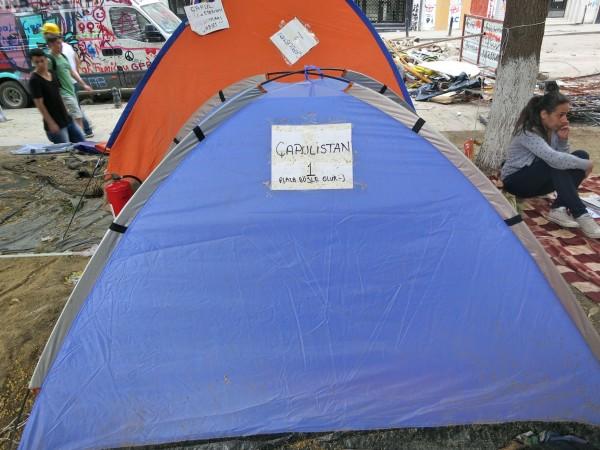Turkish protesters turn slur around in protest against government actions
This tent in Gezi Park, Istanbul, has been labelled Çapulistan — a word Turkish protesters have embraced recently. (Photo by Dalia Mortada.)
When Turkish Prime Minister Recep Tayyip Erdogan called the protesters in his cities recently çapulcular (pronounced cha-pul-ju-lar), he wasn’t paying them a compliment.
The term translates roughly to “looters”, “marauders” or “bums”.
“For him çapulcular was an insult,” community organizer Ezgi Bakcay explained. “However, for the protesters, similar to the way some threw back the gas canisters at police, we threw this word back at him.”
Although people all over Turkey have been protesting for different reasons in the past two weeks, they came together under this term.
To make sure people around the world knew how to use the term, one even protester made a tutorial video.
“I chapul every day … he chapuls every day,” the video goes. He moves onto the present continuous tense, which has a bit of English flair: “I have been chapulling for six days.” To protect him from teargas while “chapulling,” the instructor dons a surgical mask and some swimming goggles.
Turks have been using the English -ing form, “chapulling.” It means “a resistance to force, or to demand ones rights.”
Some protesters wear t-shirts with Englishized “chapuller,” or the Turkish form “çapulcu,” scribbled across them. Others labeled their tents at Gezi Park things like “No. 1 chapul street.” With this single word, it seems like a wave of creativity and humor was unleashed amongst the protesters.
A choir from the Bosphorous University took a traditional Turkish song and outfitted it with some new lyrics. They sing of gas masks and protests. They sing that the teargas is sweeter than honey.
Ezgi says protesters use ironic humour every chance they get. Graffiti was scribbled across walls and sidewalks as well as signs mixing Turkish words with Erdogan’s name.
One night, a group of football fans even commandeered an earth digger and charged it at one of the police’s “public intervention vehicles,” called TOMA for short. The protesters called their vehicle the POMA — eventually painting it pink to soften its look.
“The earth digger was lying here like a killed beast,” Ezgi said, “as if a captured enemy.”
The humor was also present in the chants and songs protesters created. Ezgi cited a group of women who came up with a slogan “Dear Tayyip (Erdogan), thanks to you we will look great this summer, because pressurized water is good for our cellulite!”
In Taksim Square, guys chanted, “Let’s see you use that pepper spray. Take off your helmets, drop your batons and let’s see who’s the real man.” Meanwhile, feminists warned Erdogan to “run away, because the women are coming.”
Not everyone could make it out to the street to have their say, though, so some did so from home. Every night at 9 p.m. for the past two weeks, neighborhoods throughout Istanbul have erupted with the clanking of wooden spoons against pots and pans, silverware against plates.
It’s not the first time pots and pans have been used to express discontent in Turkey or abroad. But this time, the sound has inspired musicians.
Kardes Turkuler, or Songs of Fraternity, is a well-known ensemble. A song they just released has become a sort of anthem for the protests. “Enough with the headstrong decrees and commands,” they sing, “We’re really fed up!”
Music has played a major role in the Gezi Park protests. Throughout the park, many played instruments, from beating their drums to blowing into bagpipes. Others danced to the music and chanted. Some created new songs based on the protests while others sang traditional tunes that passersby joined in on.
Many of the protesters say they want to hang onto this spirit of humor and creativity, especially now that their argument with the government seems to be entering a more complicated phase.
